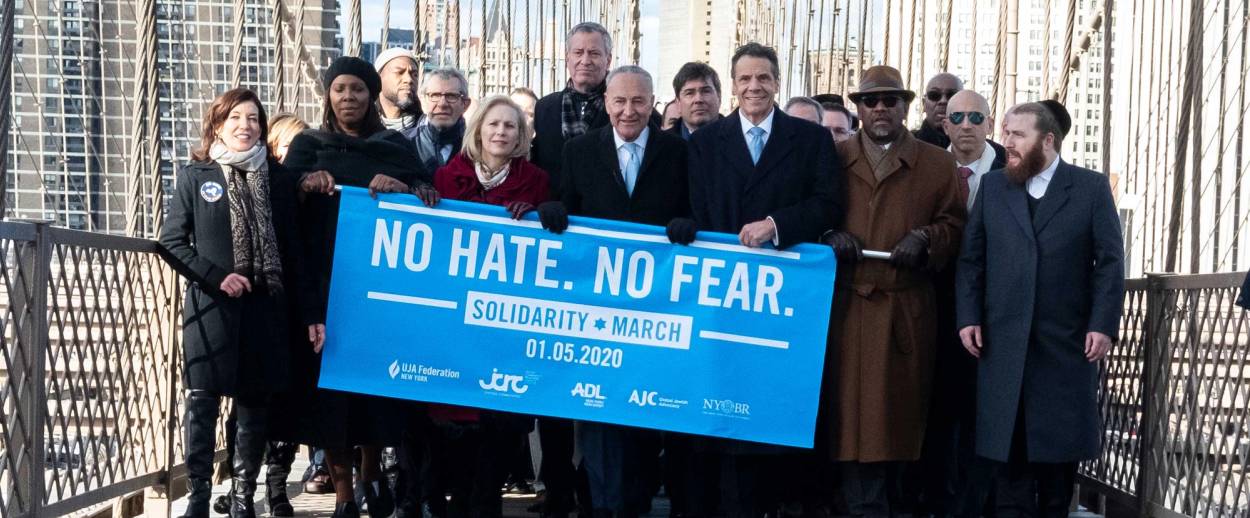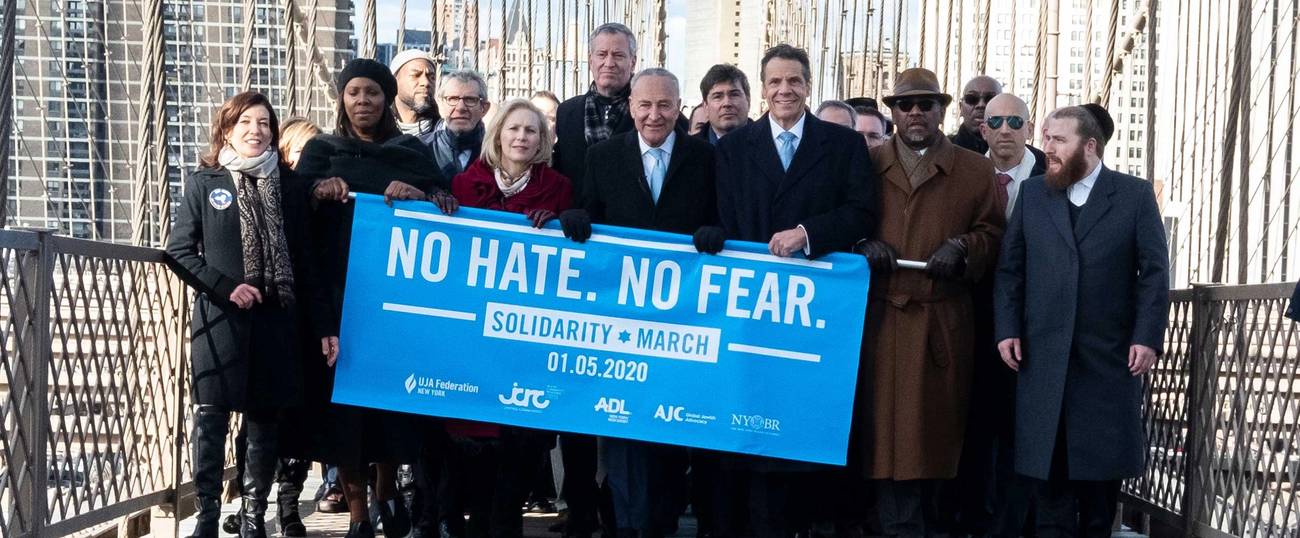In Light of Rising Anti-Semitism, Rethinking Black-Jewish Relations
When we fight for a fairer and more just America, and we fight for it as proud Jews, we all win




This past Hanukkah was the darkest in a generation. December 2019 saw a seemingly endless wave of more than a dozen hate crimes, many violent. Two anti-Semitic domestic terror attacks left three dead, five stabbed, and one unlikely to awake from a coma.
As our community grappled with fear and pain and dread, a painful question divided many of us: What does it mean that these terror attacks were not perpetrated by white nationalists, but by black people?
The question is inevitably tainted by the history of systemic American racism—we have all been force-fed the trope that black people are dangerous criminals. But for Jews the question also comes from very real, very violent specific histories. For hundreds of years, our friends and neighbors have risen up against us. From Poland to Iraq to Tunisia, Jewish history—recent history, whispered by bubbes over pots of soup or sternly handed down by aging patriarchs—is filled with stories of being massacred by people we lived beside. We have been raised to watch for warning signs. This is the context in which the question is asked. To understand our community, you must understand our deep generational trauma.
Black communities have their own inherited traumas, from slavery to Jim Crow to the KKK to mass incarceration and the war on drugs, to police brutality. These histories are just as relevant and just as painful. I am familiar with the trauma of both of these communities because I am personally and professionally rooted in both. I am the only white presenting person in my Jewish household. I am keenly aware of the dangers that my black Jewish husband and young black Jewish daughter face that I do not. I have a marriage that was illegal when my parents were born. I have spent my career organizing for justice in coalitions that crossed racial and religious lines. I have seen how much good we can accomplish together. I have heard so much pain and so much hope. Our experiences in America are fundamentally different, and yet we have a deep capacity for understanding and achievement in the fight for a just America. And now is the time to put this capacity to work.
These last few months have tested our ability to hear each other. It doesn’t help that the tabloids are pushing stories about how black-Jewish relations are imploding and that black Americans are behind the recent rise in anti-Semitism, even though only 33% of those arrested in New York for anti-Semitic hate crimes were black. There is no data that suggests black people, as organizations or individuals, are driving the rise in anti-Semitic violence in America.
There are several factors actually driving rising anti-Semitism in this country. This isn’t a black problem or a white problem, nor is it a left or right problem. It is a societal problem that needs broad-based solutions. We are living in a time of terrible political instability. We are living in a time of rapid spreading and mainstreaming of conspiracy theories, aided by the irresponsible rhetoric of our president. We are living in a time of economic frustration and anxiety, as the gap between rich and poor widens and the American middle class struggles to hold on. Fifty percent of Americans believe at least one conspiracy theory. Forty percent of Americans couldn’t handle a $400 emergency expense. Americans are losing hope in the American dream. Americans are losing hope that their children will be better off than they were.
This is fertile ground for anti-Semitism—indeed, any conspiracy theory—to grow and take hold. Our American democracy is weakened, and anti-Semitism is a virus that attacks weak bodies. It is an opportunistic infection. We must acknowledge the conditions in which anti-Semitism flourishes—instability, hopelessness, conspiracy, and fight them all rigorously. Anti-Semitism is a threat to our community. It is also a threat to all people of color, Jewish or not, because of its centrality to violent white nationalism and to all Americans because of anti-Semitism’s corrosive effect on democracy.
Which is precisely why we need to make the bonds between the Jewish and black communities stronger than ever before. We must mobilize to fight rising anti-Semitism and build a more just America together.
First, we need to loudly and unequivocally denounce anti-Semitism and violence against Jews. Thankfully, black community leaders across the political spectrum have risen to denounce it firmly and unequivocally. They include Derrick Johnson, the current president of the NAACP, his predecessor, the Rev. Cornell William Brooks, and Sherrilyn Ifill, president of the NAACP Legal Defense Fund, as well as Michael Blake, vice chairman of the DNC, Sen. Cory Booker, Sen. Kamala Harris, Rep. Gregory Meeks, and Rep. Ayanna Pressley, just to name a few. I have been deeply critical of the progressive left for being late to recognize the threat of rising anti-Semitism, and I am heartened to report that major national figures of the black left have raised their voices, including Marc Lamont Hill, Brittany Packnett Cunningham and Anthony Beckford, president of Black Lives Matter Brooklyn. They should be commended for it and welcomed to the fight, not ignored or berated for past missteps. This will build new bridges.
Second, we need to listen to black Jewish Americans. Black Jews need to be leading conversations and being elevated and celebrated by historic Jewish institutions.
Third, we need more opportunities for real dialogue and learning. Too often, interfaith and intercommunity groups appeal to no one but those already convinced, and meetings consist of nothing but reaffirming the things on which everyone in the room agrees. We need something more profound. We need spaces that welcome and engage those who are ignorant, but don’t want to be. We need deep community dialogue at the grassroots level, spaces that allow for hard questions and forbidden topics to be raised with good intentions. We need more opportunities for dialogue that takes place over weeks and years, not just an hour or cup of coffee, and provides people the opportunity to ask questions, to disagree, to learn new perspectives and understand how oppression impacts the way we move through the world. Dialogue gives us the opportunity to dismantle hate in a profound way, if we are willing to show up and listen with an open heart and open mind.
And, finally, we need to stand together. We need to understand that hate crimes are rising across America—not just for Jews. When we fight it together we are stronger. These are the moments we can show each other who we are—and these are the moments where we decide who we are. Engaging in racism will not make us safer. It will only make us crueler. Across America, interfaith and interracial political coalitions achieve victories every day—that’s how we got hate crime laws passed in the first place, with a broad coalition of communities that held out until everyone was protected. They held out for 13 years. They had the moral clarity to reject any version of the bill that left anyone out. Change doesn’t happen in silos—it happens in coalitions.
One place where we need to find new ways to stand together is the role of law enforcement in the fight against anti-Semitism. There is conflict around this, most prominently in Brooklyn, but it is a growing tension point nationwide. Some Jews believe increased police presence is vitally important to stopping hate crimes and have advocated for it. It’s not an unreasonable viewpoint, and it is not ill-intentioned. Hate crimes are crimes. We need law enforcement to monitor, prevent, investigate, and ultimately provide accountability. Law enforcement is going to be part of the equation in stemming the rise of hate crimes, anti-Semitic and otherwise, but we must also recognize the urgency of addressing police brutality directed against black Americans. While many American Jews may see a police car as a sign of safety, for many black Americans it is something to be feared. New York City spent over $230 million on police settlements last year. Black people are 2.5 times as likely to killed by police. Roughly 1 in 1,000 black boys and men are killed by police, for white men and boys that number is roughly 39 in 100,000. One study found that police were more likely to get violent with black childrenthan white adults. Our country has a long history of state violence against black Americans.
That’s why we need to speak out about police brutality regardless of what we think the role of police is in fighting anti-Semitism. We need every Jewish leader in New York raising their voices and asking the NYPD to police in a way that will not escalate community tensions or harm residents in anyway. I am not a police brutality expert, but New York City is full of them, and now is the time for us to sit down with them. They should be informing our advocacy around the role of law enforcement and helping us craft asks of government. This is how a crisis can be community-building instead of community-breaking. Instead of throwing up our hands and saying we need to pick one community’s safety over another’s, we can refuse to. We can decide that everyone must be safe and feel safe.
This is not mere goodwill, it is an existential threat to American Judaism. It is a threat to the Jewish soul. The moment we allow an innocent black neighbor to be beaten under the order to protect the Jewish community, deciding that this is an acceptable price for short-term Jewish security measures, we are lost. It will end us. Choosing to ignore the existence and safety of children like mine, who are both black and Jewish, is chillul Hashem. If we sacrifice black bodies at the altar of security we no longer worship Hashem but Moloch. We can’t let the threat of anti-Semitism break us this way. Racism desecrates us. Blood is blood is blood.
In the long term, in order to defeat anti-Semitism in America, we must fight the conditions that allow anti-Semitism to thrive. We must fight generational poverty. We must fight for an economy that works for all Americans and social safety nets that keep any American from falling through the cracks. We must fight for an America that Americans can believe in again. Pick any part of that equation and pair it with the fight against anti-Semitism. When we fight for a fairer and more just America, and we fight for it as proud Jews, we all win.
***
Like this article? Sign up for our Daily Digest to get Tablet magazine’s new content in your inbox each morning.
Carly Pildis is the Director of Grassroots Organizing for the Jewish Democratic Council of America, and an advocacy professional based in Washington, D.C. Her Twitter feed is @carlypildis, and her website is www.carlypildis.com.